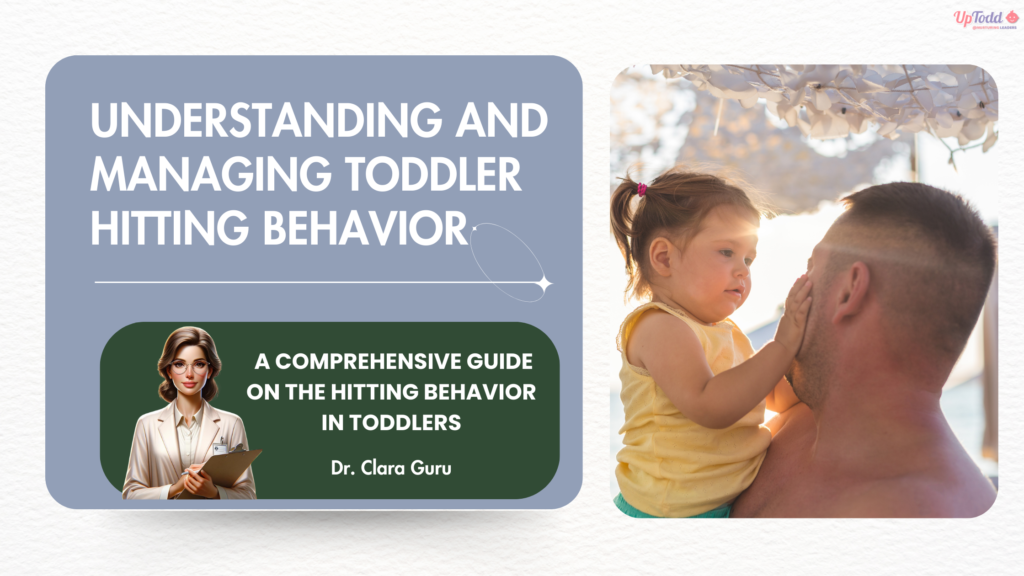
Toddlers are bundles of energy and curiosity, exploring the world around them with excitement and enthusiasm. However, along with their innocent charm, they may also exhibit challenging behaviours, such as hitting others. This toddler hitting behaviour tends to make parents extremely worried. Hence, it becomes more essential to understand the underlying reasons for this behaviour and employ effective strategies to address it positively. Let’s understand what our development expertat Uptodd, has to say about concerning aspect of toddlerhood.
Why Do Toddlers Hit?
-
Lack of words to communicate
Toddlers often lack the verbal skills to express their feelings, needs, desires, or frustrations adequately. When they are tired, hungry, frustrated, feel misunderstood, or are unable to communicate effectively, they may resort to hitting as a way to express themselves.
-
Emotional Expression
Toddlers experience a wide range of emotions but may struggle to identify, understand, or regulate them. When overwhelmed by feelings like anger, frustration, or even excitement, they may lash out physically.
-
Imitation and Experimentation
Children are keen observers and may imitate behaviours they see around them. If they witness hitting, whether in real life or through media, they may mimic it out of curiosity or as an experiment.
-
To Seek Attention
Toddlers crave attention, and negative behaviours like hitting can sometimes be a means to attract attention from parents or carers, especially if they feel neglected or overlooked.
-
They Need Their Space
Toddlers may have a strong need for independence and autonomy as they strive to assert their individuality. They may resist restrictions or attempts to control their behaviour, leading to frustration that can manifest in hitting or other challenging behaviours.
-
Physical Milestones
Physical milestones can also play a role in their hitting behaviour. Toddlers are rapidly gaining control over their bodies and testing out their newfound skills, which can sometimes result in impulsive actions like hitting. As they become more mobile and coordinated, toddlers may experiment with their physical capabilities, including hitting, pushing, or grabbing objects and people around them.
Reference from Toddler hitting others: Causes and how to stop it and Toddler Hitting: Why It Happens and How To Make It Stop
till what age is this behaviour normal?
Hitting behaviour in toddlers is relatively common and considered a normal phase of development, typically emerging around 1-2 years of age and gradually decreasing as children learn alternative ways to express themselves and regulate their emotions. Most toddlers outgrow this behaviour by the time they reach preschool age, around 3–4 years old.
Reference from Toddler hitting others: Causes and how to stop it
How do Respond?
-
First and foremost, Stay Calm
It’s crucial to remain composed when addressing hitting behaviour. Reacting with anger or frustration may escalate the situation further. Take a deep breath and approach the situation with a calm demeanour.
-
Address The behaviour Immediately and Set Clear Boundaries
Whenever you see your baby hitting someone, address it immediately in a calm but firm voice. Validate their feelings and tell them that this behaviour is not okay. You can say, “It’s OKAY to be upset but it’s not OKAY to hit.” Establish firm but gentle boundaries regarding hitting. Let your toddler know in simple language that hitting is not acceptable behaviour and explain why
-
Move Your Baby Away
Ask your child to stop in a polite but firm voice. But if your toddler still hits again, it’s important to remove them from the situation. You can gently take their hands and calmly say, “We don’t hit. I will help you find a better way to express your feelings” or “I will not let you hit.” This approach helps reinforce boundaries while also teaching alternative behaviours in a gentle and supportive manner.
-
Teach Alternative behaviours
Encourage your toddler to use words to express their feelings instead of hitting. Model appropriate language and actions, showing them how to communicate their needs effectively.
-
Provide Positive Reinforcement
Praise and reward your toddler when they choose alternative behaviours over hitting. Positive reinforcement can encourage them to continue making better choices.
-
Redirect Attention
Distract your toddler when you sense they’re becoming frustrated or agitated. Offer them a different activity or toy to shift their focus away from hitting.
-
Be Consistent
Consistency is key when addressing challenging behaviours. Enforce consequences consistently, and don’t waiver from established boundaries. This helps toddlers understand what is expected of them.
Reference from Toddler hitting others: Causes and how to stop it and Toddler Hitting: Why It Happens and How To Make It Stop
FINAL THOUGHTS BY DR. CLARA GURU
While hitting behaviour in toddlers can be concerning, it’s essential to remember that it’s a common phase of development. Dr. Clara Guru believes that with patience, understanding, and proactive intervention, parents and carers can help toddlers learn more constructive ways to navigate their emotions and communicate effectively. By addressing hitting behaviour with empathy and consistency, we can guide our little ones towards healthier interactions and emotional regulation.
Explore UpTodd to unleash the hidden abilities of the baby
FAQ
- Why is my toddler hitting?
- Is it a normal phase?
- What can I do to stop this behavior?
